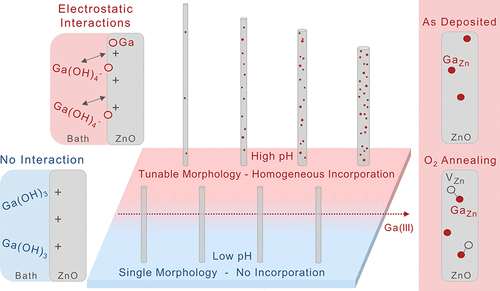
-
- au
Ici vous trouverez le papier de Pierre Gaffuri
"ZnO nanowires grown by chemical bath deposition (CBD) are of high interest, but their doping with extrinsic elements including gallium in aqueous solution is still challenging despite its primary importance for transparent electrodes and electronics, and for mid-infrared plasmonics. We elucidate the formation mechanisms of ZnO nanowires by CBD using zinc nitrate and hexamethylenetetramine as standard chemical precursors, as well as gallium nitrate and ammonia as chemical additives. A complete growth diagram, revealing the effects of both the relative concentration of gallium nitrate and pH, is gained by combining a thorough experimental approach with thermodynamic computations yielding theoretical solubility plots as well as Zn(II) and Ga(III) speciation diagrams. The role of Ga(OH)4– complexes is specifically shown as capping agents on the m-plane sidewalls of ZnO nanowires, enhancing their development and hence decreasing their aspect ratio. Additionally, the gallium incorporation into ZnO nanowires is investigated in detail by chemical analyses and Raman scattering. They show the predominant formation of gallium substituting for zinc atoms (GaZn) in as-grown ZnO nanowires and their partial conversion into GaZn–VZn complexes after postdeposition annealing under oxygen atmosphere. The conversion is further related to a significant relaxation of the strain level in ZnO nanowires. These findings reporting the physicochemical processes at work during the formation of ZnO nanowires and the related gallium incorporation mechanisms offer a general strategy for their extrinsic doping and open the way for carefully controlling their physical properties as required for nanoscale device engineering."


